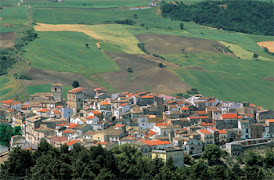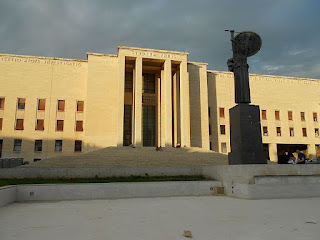Filippo Inzaghi - football manager
World Cup winning player turned successful coach
The former Azzurri striker Filippo Inzaghi, who was a member of Italy’s 2006 World Cup-winning squad, was born on this day in 1973 in Piacenza. A traditional goal poacher, known more for his knack of being in the right place at the right moment than for a high level of technical skill, Inzaghi scored 313 goals in his senior career before retiring as a player in 2012 and turning to coaching. He spent the 2019-20 season in charge of Serie B side Benevento, near Naples. Inzaghi came off the substitutes’ bench to score the second goal as Italy beat the Czech Republic 2-0 to clinch their qualification for the knock-out stage of the 2006 World Cup in Germany but found it impossible to win a starting place in competition with Luca Toni, Alberto Gilardino, Francesco Totti and Alessandro Del Piero in Marcello Lippi’s squad. He also picked up a runners-up medal in Euro 2000, hosted jointly by Belgium and the Netherlands, where he scored against Turkey in the opening group game and against Romania in the quarter-final but was overlooked by coach Dino Zoff in his team for the final. Read more…
____________________________________
Romano Prodi – politician
Il professore became prime minister and European Commission president
Romano Prodi, who has twice served as prime minister of Italy, was born on this day in 1939 in Scandiano in Emilia-Romagna. A former academic, who was nicknamed Il professore by the Italians, Prodi was also president of the European Commission from 1999 to 2004. Prodi graduated from the Catholic University in Milan in 1961 and studied as a postgraduate at the London School of Economics. After moving up to become professor of economics at Bologna University, Prodi served the Italian government as minister for industry in 1978. In 1996 after two productive stints as chairman of the Institute for Industrial Reconstruction, Prodi set his sights on becoming Italy’s prime minister and built a centre-left base of support known as the Olive Tree coalition. While Silvio Berlusconi used television to campaign, Prodi went on a five-month bus tour around Italy, calling for more accountability in government. His approach appealed to the voters and his coalition won by a narrow margin. Prodi was appointed prime minister of Italy for the first time on May 17, 1996. He remained prime minister for two years and four months. Read more…
_____________________________________
Leaning Tower of Pisa
Poor foundations created tourist attraction by accident
Work began on the construction of a freestanding bell tower for the Cathedral in Pisa on this day in 1173. The tower’s famous tilt began during the building process. It is believed to have been caused by the laying of inadequate foundations on ground that was too soft on one side to support the weight of the structure. The tilt became worse over the years and restoration work had to be carried out at the end of the 20th century amid fears the tower would collapse. At its most extreme the tower leaned at an angle of 5.5 degrees but since the restoration work undergone between 1990 and 2001 the tower leans at about 3.99 degrees. The identity of the architect responsible for the design of the tower is not clear but the problem with the structure began after work had progressed to the second floor in 1178. It is thought the tower would have toppled had construction not been halted for almost a century while Pisa, a Tuscan seaport, fought battles with Genoa, Lucca and Florence. This allowed time for the soil beneath the tower to settle. When construction resumed in 1272, the upper floors were built with one side taller than the other to compensate for the tilt. Read more…
_____________________________________
Book of the Day: The Italian Job: A Journey to the Heart of Two Great Footballing Cultures, by Gianluca Vialli and Gabriele Marcotti
Football lies at the heart of popular culture in both England and Italy. It is played, watched, written about and talked to death by millions virtually every day of the year. But how do the characteristics of England and Italy affect the game in these two footballing nations? Do the national stereotypes of Italians as passionate, stylish lotharios and the English as cold-hearted eccentrics still hold true when they kick a ball around? In The Italian Job, for the first time, a footballer of the first rank, the late Gianluca Vialli, in conjunction with sportswriter and broadcaster Gabriele Marcotti, tackled this debate head on, providing a fascinating and highly controversial commentary on where football is now and where it's headed. They have invited some of the biggest names in the sport to join in their discussion. Sir Alex Ferguson, Jose Mourinho, Arsene Wenger, Sven Goran Eriksson, Fabio Capello and Marcello Lippi, amongst others, add their not inconsiderable weight to the highest-profile symposium on football ever convened. The Italian Job takes you on a journey to the very heart of two of the world's great footballing cultures.Gianluca Vialli, who died from pancreatic cancer in January 2023, played for Cremona, Sampdoria and Juventus in his native Italy, for Chelsea in England, and 59 times for the Italian national team, before managing Chelsea and Watford. Milan-born Gabriele Marcotti has written and broadcast about football in Italy, the United States and England.
(To the best of our knowledge, all of Italy On This Day's posts were factually accurate at the time of writing. In the case of individuals still living, some of the information may need updating)

.jpg)
.jpg)

.jpg)

.jpg)
.jpg)


.jpg)
.jpg)



_scena_.jpg)

.jpg)
